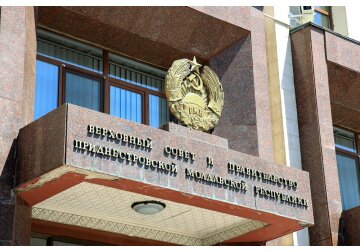
The Transnistrian authorities took a number of measures in response to Moldova’s decision to levy customs duties from Transnistrian companies on general principles from January 1.
In particular, the regional government reviewed and adopted a number of regulations aimed at increasing the budget revenues of the Transnistrian region by changing the procedure for customs clearance of goods of Moldovan farmers and increasing utility tariffs for certain categories of consumers under the jurisdiction of Moldova. As noted in the message of the regional Cabinet of Ministers, “the tense geopolitical situation along the perimeter of Transnistria negatively affects the treasury and requires a revision of approaches in a number of areas.” And in this regard, a package of proposals to correct the situation was approved. In particular, it was agreed that the validity period of the procedure for special simplified registration of individuals and legal entities cultivating agricultural land located in the Dubasari district northeast of the Tiraspol-Camenca highway and exporting agricultural products abroad will be extended by one quarter - until the end of March, produced on these lands, by individuals and legal entities of the villages Doroțcaia, Pîrîta, Coșnița, Pogrebea, Cocieri, Molovata Noau, Vasilievca. Herewith, customs clearance of goods transported by such persons will be carried out in accordance with the requirements of the regional Customs Code. This means that the following customs procedures will apply: release for domestic consumption, export, temporary import and re-export. Previously, this category of land users was subject to a special customs procedure, which did not provide for the collection of customs duties and customs payments when carrying out operations on foreign economic activity. Now the approach is unified. As a result, it is planned to increase revenues to the regional budget. In development of the adopted regulatory act, a draft amendment to the regional Customs Code was developed: it is planned to stop the application of a special customs procedure in relation to goods transported by land users of agricultural land in the Dubasari region. As noted, to date, tenants of land in the Dubasari region have not paid customs duties and taxes when moving grown products across the border. The Cabinet of Ministers of Transnistria noted that in the context of the need to find sources of replenishment of the treasury, a uniform approach to the levy of customs duties on goods is reasonable. An amendment was also made to the resolution “On some features of the application of customs procedures.” Now, for land users of the Dubasari region, the mechanism for moving goods has been changed, which will allow the collection of customs duties before the adoption of changes to the Customs Code, which were discussed above. In addition, in order to determine the same conditions of transportation to preserve the road surface of public roads and increase revenues to the Road Fund of Transnistria, a decision was made to terminate the benefit for the temporary import of vehicles registered in Moldova. Now, owners of cars with Moldovan license plates permanently residing in the village of Doroțcaia, Dubasari district, will pay a vignette fee. In addition, the government of Transnistria has revised its approach to setting maximum tariff levels for utility services in 2024. It refers to gas supply, electricity services, heat supply services, water supply and sanitation. It was agreed that on February 1, for legal entities located in Transnistria, but under the jurisdiction of Moldova, tariffs will correspond to those established in Moldova. The changes will also affect those who work in public authorities and management, in organizations, institutions or unitary enterprises in Moldova, but live in the Transnistrian region. A similar mechanism operated in 2015-2016. Payment will be made in Transnistrian rubles at the official rate. So, for 1 cubic m of gas, employees of Moldovan organizations will pay 15.97 rubles, for 1 kilowatt of electricity - 2.54 rubles, for 1 cubic meter of water - more than 11 rubles. The cost of heating per month will be 2,942 rubles. // 09.01.2024 — InfoMarket


